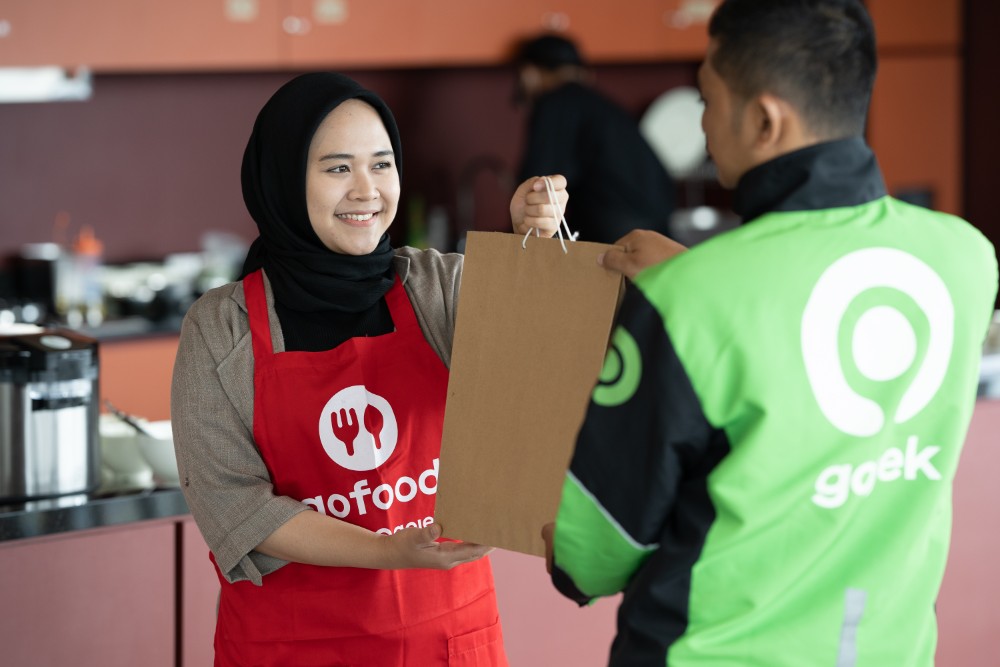In 2015, the concept of sharing economy has not become part of the daily life of the Indonesian people. In a survey involving 1008 people, 85% of respondents said they had heard this concept, but still less than 40% had tried it. In 2020, such services have become a necessity and part of a lifestyle.
According to data at the end of the first quarter of 2020, Gojek, Indonesia’s largest local economic sharing platform, has operated in 214 cities and five Southeast Asian countries with more than 2 million driver-partners. The application is claimed to have been downloaded more than 170 million times by consumers in the region. According to App Annie’s report titled “2020 State of Mobile Report”, Gojek has become the most widely used on-demand application for Indonesians throughout 2019.
The sharing economy has now become many people’s sources of income in the ecosystem, including driver-partners, restaurant business owners, and various service providers (cleaning, massage, health, etc.).
The current outbreak of Covid-19 in Indonesia directly affects the use of services and the welfare of these ecosystem partners. According to INDEF (Institute for Development of Economics and Finance) Researcher, Nailul Huda, the impact is a bit burdensome for the business industry with the concept of sharing economy.
“The demand will automatically decrease. There will be less people ordering motorcycle taxi services online or lodging based on sharing economy. This is quite hard for some partners that their services will lose a significant income,” Huda said.
Gojek’s initiative to support partners and merchants

With no further explanation on the percentage decrease in the number of uses in the ecosystem, Gojek’s Chief of Corporate Affairs Nila Marita told DailySocial that there are many changes during this pandemic. Nevertheless, Gojek claims to build a strategic and sustainable business that does not only rely on one service.
“Although the large-scale restrictions (PSBB) has affected online transportation services, we finally see a shift in people’s behavior from transacting offline to online, because most people have to do most activities from home to avoid the risk of spreading the virus,” Marita said.
She also added the shift in offline to online transactions is quite a thing, especially in food delivery services, groceries, and shipping goods. People’s habit of eating on the spot (dine-in) and buying their groceries in stores or supermarkets, is now shifting to online purchases.
Gojek moves quickly to adjust, such as expanding GoFood services from only food delivery orders to groceries, daily necessities and ready-to-cook food.
“We also help our SME partners to be able to conduct their business online so that they do not lose the opportunity to maintain revenue and business turnover. The ability to adapt quickly to this situation is one of our competitive advantages to be able to continue to maintain business sustainability amid pandemic,” She added.
Gojek also provides financial support to partners. The funding comes from three sources. Gojek’s co-CEO and senior management will donate 25% of their annual salary over the next 12 months, the annual salary increase of all Gojek employees will be diverted to aid funds, and also creating a foundation to help others make donations, including Gojek’s corporate partners.
In a joint statement, Gojek’s Co-CEO Andre Soelistyo and Kevin Aluwi said, “This fund will support the driver-partners as part of our core business and have become a vital part of people’s lives who are currently experiencing limited mobility. The thing is that every company has the responsibility to provide as much support as possible and this is something we can do to help our partners through this hard season.”
Furthermore, Gojek and Bank BRI launched a mild interest loan facility for GoRide partners, GoCar, and GoFood merchants. Gojek partners who register and fulfill BRI requirements have the potential to obtain a loan facility of Rp.5-20 million.
Seekmi’s new innovation

Meanwhile, Seekmi platform is trying to expand services to accommodate the needs of its consumers. According to the CEO, Clarissa Leung, most businesses in Indonesia and throughout the world have experienced a slowdown due to the crisis. The best thing about Seekmi is the flexibility of the business changes.
“For example, we have been able to reuse cleaning workers and utilize their existing expertise, with some additional training, to provide disinfection cleaning services. We’re also able to provide jobs for our engineers to help build and assemble furniture, a developed area as a result of Work From Home implementation. Our technology platform is very powerful that it can manage all types of ‘blue-collar’ workforce and easily adapt to different situations,” Leung said.
After the pandemic, Clarissa can see that the services provided by her company would experience technology adoption faster than before. In fact, households and businesses can no longer function in the same way.
“We are also exploring partnerships with lending companies to provide loans to our technicians and cleaners,” she said.
Grab Indonesia’s campaign #KitaVSCorona

With a policy to remain at home in order to reduce the spread of the Covid-19 virus, many SMEs are feeling the impact on their livelihoods. Digitalization can help them. The move was chosen by Grab to help small and traditional businesses to adapt to this new trend. The company tried to help them maintain revenue, even with various restrictions.
Grab claims, during the pandemic, delivery business services have increased, including GrabFood, GrabExpress, GrabMart, GrabFresh by HappyFresh, and the latest concierge on-demand access, GrabAssistant.
“As a super-app, Grab believes in technology for good (tech for good) to create positive social impacts both for each of our partners, such as driver-partners, merchant partners, delivery partners, and also our customers. Therefore, Grab always strives “to create large-scale economic opportunities, financial inclusion for the underserved, and easy access to safer and higher-quality daily services,” Grab Indonesia’s Managing Director Neneng Goenadi told DailySocial.
Similar to Gojek, Grab Indonesia and Bank BRI collaborated to launch a mild interest loan facility for Grab driver-partners, GrabFood merchant partners, and GrabKios partners. This loan aims to ease the financial burden of the affected driver-partners. In addition, the distribution of People’s Business Credit (KUR) is expected to help GrabFood merchants and GrabKios partners to get the financial assistance they need to overcome challenges during this pandemic.
“We are conducting socialization for driver-partners who have the opportunity to get this loan facility. Driver-partners who can get this loan are productive and active partners and have been Grab’s driver-partners for several years. In addition, the partners concerned must have good performance including certain average income amounts,” Goenadi said.
The future of sharing economy
The new normal term seems to affect the sharing economy platforms such as Gojek, Seekmi, and Grab. Not only in terms of the approach to target customers but also the company’s approach to driver and merchant partners. The use of non-cash payments is becoming more common and the application of technology is expected to provide a more efficient and faster implementation of new situations.
After the pandemic, the community will be more concerned with health and hygiene factors. Digital industry services based on sharing economy will also be more selective in choosing partners.
“Their business will soon arise following the good record,” Huda said.
–
Original article is in Indonesian, translated by Kristin Siagian
